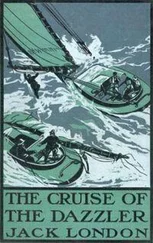Jack London - The Cruise of the Snark
Здесь есть возможность читать онлайн «Jack London - The Cruise of the Snark» весь текст электронной книги совершенно бесплатно (целиком полную версию без сокращений). В некоторых случаях можно слушать аудио, скачать через торрент в формате fb2 и присутствует краткое содержание. Жанр: Классическая проза, Морские приключения, на английском языке. Описание произведения, (предисловие) а так же отзывы посетителей доступны на портале библиотеки ЛибКат.
- Название:The Cruise of the Snark
- Автор:
- Жанр:
- Год:неизвестен
- ISBN:нет данных
- Рейтинг книги:3 / 5. Голосов: 1
-
Избранное:Добавить в избранное
- Отзывы:
-
Ваша оценка:
- 60
- 1
- 2
- 3
- 4
- 5
The Cruise of the Snark: краткое содержание, описание и аннотация
Предлагаем к чтению аннотацию, описание, краткое содержание или предисловие (зависит от того, что написал сам автор книги «The Cruise of the Snark»). Если вы не нашли необходимую информацию о книге — напишите в комментариях, мы постараемся отыскать её.
The Cruise of the Snark — читать онлайн бесплатно полную книгу (весь текст) целиком
Ниже представлен текст книги, разбитый по страницам. Система сохранения места последней прочитанной страницы, позволяет с удобством читать онлайн бесплатно книгу «The Cruise of the Snark», без необходимости каждый раз заново искать на чём Вы остановились. Поставьте закладку, и сможете в любой момент перейти на страницу, на которой закончили чтение.
Интервал:
Закладка:
We ran down the lagoon from Langa Langa, between mangrove swamps, through passages scarcely wider than the Minota, and past the reef villages of Kaloka and Auki. Like the founders of Venice, these salt-water men were originally refugees from the mainland. Too weak to hold their own in the bush, survivors of village massacres, they fled to the sand-banks of the lagoon. These sand-banks they built up into islands. They were compelled to seek their provender from the sea, and in time they became salt-water men. They learned the ways of the fish and the shellfish, and they invented hooks and lines, nets and fish-traps. They developed canoe-bodies. Unable to walk about, spending all their time in the canoes, they became thick-armed and broad-shouldered, with narrow waists and frail spindly legs. Controlling the sea-coast, they became wealthy, trade with the interior passing largely through their hands. But perpetual enmity exists between them and the bushmen. Practically their only truces are on market-days, which occur at stated intervals, usually twice a week. The bushwomen and the salt-water women do the bartering. Back in the bush, a hundred yards away, fully armed, lurk the bushmen, while to seaward, in the canoes, are the salt-water men. There are very rare instances of the market-day truces being broken. The bushmen like their fish too well, while the salt-water men have an organic craving for the vegetables they cannot grow on their crowded islets.
Thirty miles from Langa Langa brought us to the passage between Bassakanna Island and the mainland. Here, at nightfall, the wind left us, and all night, with the whale-boat towing ahead and the crew on board sweating at the sweeps, we strove to win through. But the tide was against us. At midnight, midway in the passage, we came up with the Eugenie, a big recruiting schooner, towing with two whale-boats. Her skipper, Captain Keller, a sturdy young German of twenty-two, came on board for a "gam," and the latest news of Malaita was swapped back and forth. He had been in luck, having gathered in twenty recruits at the village of Fiu. While lying there, one of the customary courageous killings had taken place. The murdered boy was what is called a salt-water bushman—that is, a salt-water man who is half bushman and who lives by the sea but does not live on an islet. Three bushmen came down to this man where he was working in his garden. They behaved in friendly fashion, and after a time suggested kai-kai. Kai-kai means food. He built a fire and started to boil some taro. While bending over the pot, one of the bushmen shot him through the head. He fell into the flames, whereupon they thrust a spear through his stomach, turned it around, and broke it off.
"My word," said Captain Keller, "I don't want ever to be shot with a Snider. Spread! You could drive a horse and carriage through that hole in his head."
Another recent courageous killing I heard of on Malaita was that of an old man. A bush chief had died a natural death. Now the bushmen don't believe in natural deaths. No one was ever known to die a natural death. The only way to die is by bullet, tomahawk, or spear thrust. When a man dies in any other way, it is a clear case of having been charmed to death. When the bush chief died naturally, his tribe placed the guilt on a certain family. Since it did not matter which one of the family was killed, they selected this old man who lived by himself. This would make it easy. Furthermore, he possessed no Snider. Also, he was blind. The old fellow got an inkling of what was coming and laid in a large supply of arrows. Three brave warriors, each with a Snider, came down upon him in the night time. All night they fought valiantly with him. Whenever they moved in the bush and made a noise or a rustle, he discharged an arrow in that direction. In the morning, when his last arrow was gone, the three heroes crept up to him and blew his brains out.
Morning found us still vainly toiling through the passage. At last, in despair, we turned tail, ran out to sea, and sailed clear round Bassakanna to our objective, Malu. The anchorage at Malu was very good, but it lay between the shore and an ugly reef, and while easy to enter, it was difficult to leave. The direction of the southeast trade necessitated a beat to windward; the point of the reef was widespread and shallow; while a current bore down at all times upon the point.
Mr. Caulfeild, the missionary at Malu, arrived in his whale-boat from a trip down the coast. A slender, delicate man he was, enthusiastic in his work, level-headed and practical, a true twentieth-century soldier of the Lord. When he came down to this station on Malaita, as he said, he agreed to come for six months. He further agreed that if he were alive at the end of that time, he would continue on. Six years had passed and he was still continuing on. Nevertheless he was justified in his doubt as to living longer than six months. Three missionaries had preceded him on Malaita, and in less than that time two had died of fever and the third had gone home a wreck.
"What murder are you talking about?" he asked suddenly, in the midst of a confused conversation with Captain Jansen.
Captain Jansen explained.
"Oh, that's not the one I have reference to," quoth Mr. Caulfeild.
"That's old already. It happened two weeks ago."
It was here at Malu that I atoned for all the exulting and gloating I had been guilty of over the Solomon sore Charmian had collected at Langa Langa. Mr. Caulfeild was indirectly responsible for my atonement. He presented us with a chicken, which I pursued into the bush with a rifle. My intention was to clip off its head. I succeeded, but in doing so fell over a log and barked my shin. Result: three Solomon sores. This made five all together that were adorning my person. Also, Captain Jansen and Nakata had caught gari-gari. Literally translated, gari-gari is scratch-scratch. But translation was not necessary for the rest of us. The skipper's and Nakata's gymnastics served as a translation without words.
(No, the Solomon Islands are not as healthy as they might be. I am writing this article on the island of Ysabel, where we have taken the Snark to careen and clean her cooper. I got over my last attack of fever this morning, and I have had only one free day between attacks. Charmian's are two weeks apart. Wada is a wreck from fever. Last night he showed all the symptoms of coming down with pneumonia. Henry, a strapping giant of a Tahitian, just up from his last dose of fever, is dragging around the deck like a last year's crab-apple. Both he and Tehei have accumulated a praiseworthy display of Solomon sores. Also, they have caught a new form of gari-gari, a sort of vegetable poisoning like poison oak or poison ivy. But they are not unique in this. A number of days ago Charmian, Martin, and I went pigeon-shooting on a small island, and we have had a foretaste of eternal torment ever since. Also, on that small island, Martin cut the soles of his feet to ribbons on the coral whilst chasing a shark—at least, so he says, but from the glimpse I caught of him I thought it was the other way about. The coral-cuts have all become Solomon sores. Before my last fever I knocked the skin off my knuckles while heaving on a line, and I now have three fresh sores. And poor Nakata! For three weeks he has been unable to sit down. He sat down yesterday for the first time, and managed to stay down for fifteen minutes. He says cheerfully that he expects to be cured of his gari-gari in another month. Furthermore, his gari-gari, from too enthusiastic scratch- scratching, has furnished footholds for countless Solomon sores. Still furthermore, he has just come down with his seventh attack of fever. If I were king, the worst punishment I could inflict on my enemies would be to banish them to the Solomons. On second thought, king or no king, I don't think I'd have the heart to do it.)
Читать дальшеИнтервал:
Закладка:
Похожие книги на «The Cruise of the Snark»
Представляем Вашему вниманию похожие книги на «The Cruise of the Snark» списком для выбора. Мы отобрали схожую по названию и смыслу литературу в надежде предоставить читателям больше вариантов отыскать новые, интересные, ещё непрочитанные произведения.
Обсуждение, отзывы о книге «The Cruise of the Snark» и просто собственные мнения читателей. Оставьте ваши комментарии, напишите, что Вы думаете о произведении, его смысле или главных героях. Укажите что конкретно понравилось, а что нет, и почему Вы так считаете.







